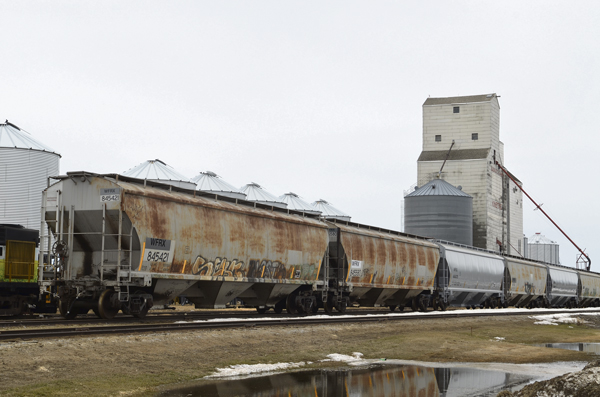The rail strike is over.
Canadian National Railway (CN) and the Teamsters reached a tentative agreement Tuesday to renew the collective agreement for over 3,000 conductors, trainpersons and yard workers. The agreement brings the weeklong Teamsters’ strike to an end. Normal operations were set to resume at 6 a.m. today across Canada.
The tentative agreement will not be ratified by Teamster members via secret ballot electronic voting. Union meetings will be held across the country to explain the terms of the agreement to members. That process is expected to take several weeks. Details will not be released until members have had a chance to review the agreement.
“I am pleased to announce that we’ve reached a tentative agreement with CN. I would like to thank our members for their incredible courage and solidarity,” said the president of Teamsters Canada, François Laporte in a media release.
“I would also like to thank all the Teamster local unions from across different industries, all the labour organizations and members of the public who supported us on the picket line.”
The Teamsters also thanked the federal government for resisting calls to legislate the railway workers back to work.
“Previous governments routinely violated workers’ right to strike when it came to the rail industry,” Laporte said. “This government remained calm and focused on helping parties reach an agreement, and it worked.”
CN thanked its customers for their patience and assured them that “CN is preparing to resume full rail operations as soon as possible.
“I would also like to personally thank our employees who kept the railroad moving safely at a reduced capacity,” said CN president and chief executive officer JJ Ruest in a press release.
“CN and its people are committed to moving the North American economy by providing freight service that enables economic growth.”
The news was met with celebration from agriculture groups.
The Agricultural Producers Association of Saskatchewan (APAS) called on CN to provide an updated winter shipping plan.
“The one-week strike has threatened the remainder of our shipping season,” APAS president Todd Lewis said in a press release.
“This is crunch time for our cash flow and producers need to move grain to get paid. We need to know how CN plans to make up the shipping shortfall. We can’t afford to have this problem drag on all winter and spring.”
In their press release, APAS said it “welcomes” the tentative settlement of the labour dispute.
The Western Canadian Wheat Growers wrote that they were “pleased” the two sides had come to a tentative agreement. They said that it will take time to fill a backlog of cargo ships waiting in Vancouver and that CN needs to use all available rolling stock and personnel to maximize the movement of grain. Farmers do not receive payment until the shipment is complete, they said, and bills need to be paid.
“Our global markets depend on the timely shipping of our products. It is imperative that we are able to meet our contractual obligations,” said Gunter Jochum, Western Canadian Wheat Growers president.
The organization’s Saskatchewan director called on the federal government to designate rail service as an essential service to ensure “that grain farmers are not held ransom in the future.”
Saskatchewan Premier Scott Moe was speaking at the Canadian Western Agribition as a keynote speaker at an event presented by CN. While speaking, he was told the tentative agreement had been reached. He greeted the news as “precisely what we needed here in this province.”
Still, Moe warned, there is a backlog and the challenges aren’t yet behind the province.
According to CN’s 2019-20 Winter Plan, once temperatures drop below -25 C the company will be forced to run shorter trains and slow down due to safety concerns. That limits efficiency.
Moe said his government will have discussions with federal Transport Minister Marc Garneau to ask whether it’s possible to push that back longer as a way to resolve the backlog.
“I’m asking him to look at the plans that will be submitted to him very seriously,” said Moe. “Maybe we are able to continue with some of our summer transport capacity much longer into the winter or throughout the winter.”
NDP leader Ryan Meili said he too agrees with the idea of getting more Saskatchewan commodities moving. But he has previously raised safety concerns as unionized workers warned about fatigue leading to accidents.
He said CN can afford to bring on more workers to ensure it can run enough trains to get grain to market without compromising safety.
“None of that is impossible,” he said, noting the company brought in revenue around $4 billion last quarter.
While the strike has come to an end, a side effect of the dispute will still affect Saskatchewan workers.
On Monday, Nutrien said it would suspend production at its Rocanville site, which is east of Regina, due to a backlog of inventory caused by the strike.
While the strike is over, the company said on Tuesday that the supply backlog still exists and that the two-week shutdown will continue. According to CBC News, the union representing workers at that mine estimates more than 500 people will be laid off during the temporary shutdown.
–with Regina Leader-Post files from Arthur White-Crummey


